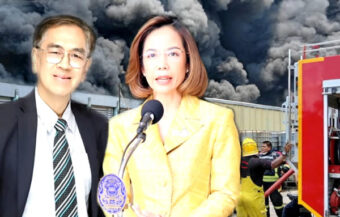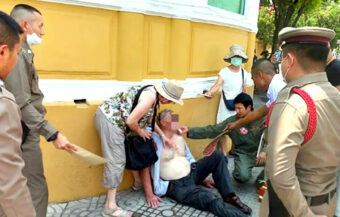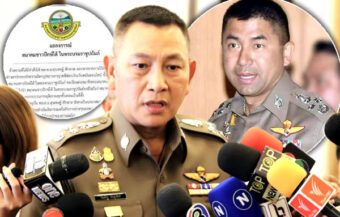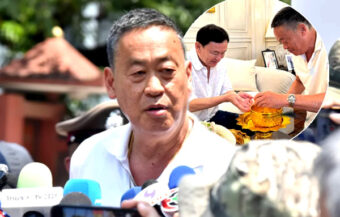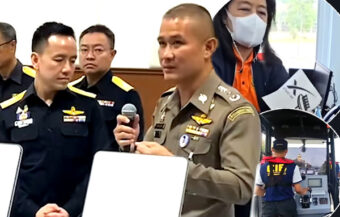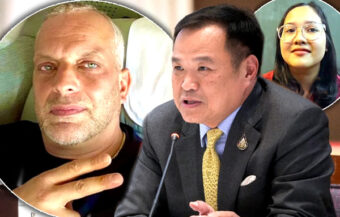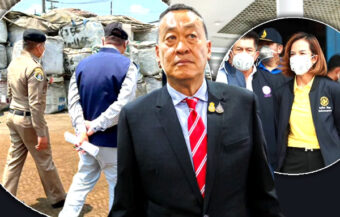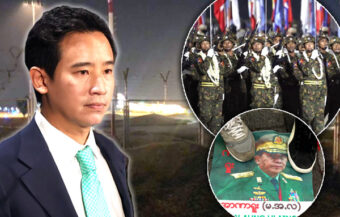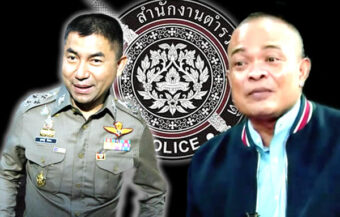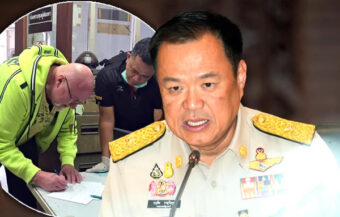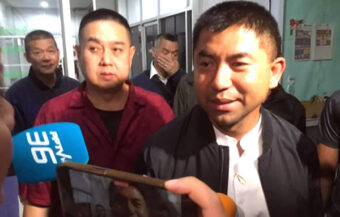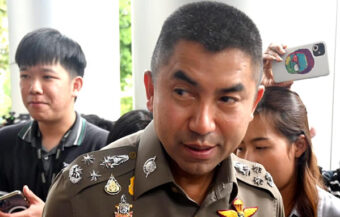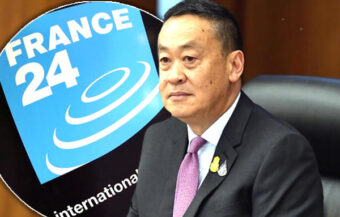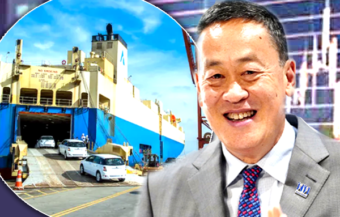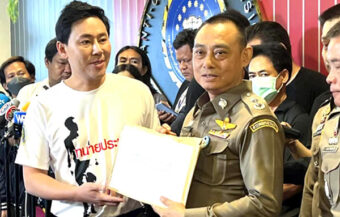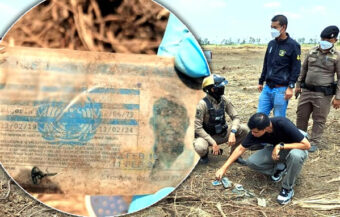Pheu Thai has called for a cross-party panel in the House of Representatives to discuss the ruling of the Constitutional Court this week which has implications for political parties as well as the protesters on the streets who, since August 2020, have called for reform of the monarchy including the repeal of Article 112. It comes as the government was forced to defend the legal provision this week after it was strongly criticised by the UN Human Rights Council as a fundamental limit on free speech.
A judgment of the Constitutional Court on Wednesday may have significant political ramifications for politics in Thailand as parties prepare for a possible early General Election in 2022. The ruling held that the protest activity of three key student movement leaders, which began at Thammasat University in August last year with calls for reform of the monarchy, was an attempt to overthrow the government and was therefore illegal under the law placing it firmly outside the scope of constitutional liberties. The ruling has already been referred to by senior government figures such as Deputy Prime Minister Wissanu Krea-ngam and Prawit Wongsuwan as a warning to those protesting on the streets. It is also being reviewed by political parties in the House of Representatives who had been pushing for reforms in response to the protest movement. The ruling could result in a change in the political discourse in the country with more polarisation which will have an impact on the country’s largest political party, Pheu Thai, which has been gearing up to make the next election about the country’s economic future.
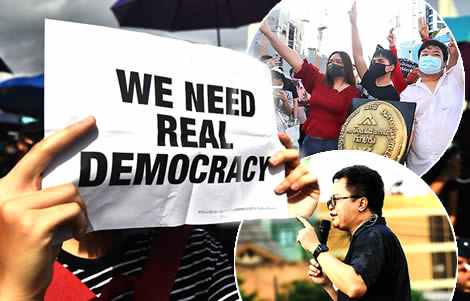
There are fears that Thailand’s political environment may become even more polarised after what is considered a landmark ruling by the country’s Constitutional Court on Wednesday which held that three key student protest leaders violated Section 49 of the constitution in seeking to overthrow the democratic regime with the King as Head of State at a protest held at Thammasat University’s Pathum Thani campus on Monday, August 10th 2020.
At the time, the statements and agenda published by student protest leaders, Arnon Nampa, Panupong Chadnok and Panusaya ‘Rung’ Sithijirawattanakul, rocked the establishment causing shock and alarm by calling for reform of the royal institution.
PM last year warned that the country could end up ‘engulfed in flames’ as a result of the line taken by protest leaders in their unprecedented demands
At the time, Prime Minister Prayut Chan ocha expressed grave disquiet following the event and later questioned if young people were being misled or manipulated by hidden forces.
He had earlier warned that the path being taken by the protest leaders could potentially lead the country to become engulfed in flames.
Student protest targeted at Monarchy on Monday night widely condemned by Thai political leaders as divisive
The event even drew censure from Jatuporn Prompan, the Chairman of the United Front for Democracy against Dictatorship (UDD) who said drawing the monarchy into the political arena was counterproductive.
This was a view widely accepted, at that point, across the political divide.
The protest also led to an apology from university officials.
UN body calls on Thailand to amend Article 112 citing it is a fundamental restriction on free speech
This week’s ruling and the determined insistence of the protesters in sticking to their demands which include the abolition of Article 112 of the Criminal Code on lèse-majesté, has made that protest a seminal moment in a political struggle that erupted in July 2020 but which can be traced back to the disbandment of the Future Forward Party in February that year.
Future Forward Party dissolved – leadership banned from politics by Constitutional Court order
This week’s court decision comes days after the government was forced to defend its position in support of Article 112 after a working group of the UN Human Rights Council urged that it take steps to amend the law which, it said, restricted fundamental rights of expression in Thailand.
The panel referenced its expanded use in the recent political struggle after violent confrontations between police and protesters.
The Thai government only reintroduced prosecutions under the law in November last year after a moratorium had reportedly been implemented at the request of the monarch King Maha Vajiralongkorn to the government in 2018.
Ministry of Foreign Affairs, in a robust response, stoutly defended the legal provision as a necessary safeguard for the country’s security and values
In a robust response from the Ministry of Foreign Affairs, spokesman Nadhavathna Krishnamra defended the provision as a key instrument in protecting the country’s traditions and culture as well as its underlying security.
‘It reflects the culture and history of Thailand, where the monarchy is one of the main pillars of the nation, highly revered by the majority of Thai people,’ he said. ‘Its existence is closely linked to safeguarding the key national institutions and national security.’
Thailand has the highest human rights standard in ASEAN says Foreign Minister Don Pramudwinai
After Tuesday’s cabinet meeting of the government, the Minister of Foreign Affairs and Deputy Prime Minister, Don Pramudwinai, commented that Thailand was foremost among the countries in the 10 member ASEAN bloc in promoting a legal and administrative regime that allows for equality and access to healthcare.
Mr Don said that Thailand had the highest standard of human rights in the ASEAN community.
Prime Minister Prayut Chan ocha has repeatedly told foreign leaders and international bodies, especially after Thailand’s return to democracy after the General Election in 2019, that the kingdom was committed to expanding and deepening human rights in the country.
Such protest activity is now defined as illegal with the scope of political debate also limited and questionable
This week’s ruling by a majority vote now means that under the law, such political activity and utterances are unconstitutional and unlawful.
The ruling has already led to the government’s chief legal adviser Deputy Prime Minister Wissanu Krea-ngam issuing a warning to protesters that their continued actions and demands were a threat to the constitutional monarchy.
He said the ruling specifically meant that they can no longer claim to be exercising constitutional rights in relation to their activities where they infringe on the monarchy.
‘They must be more careful in future rallies,’ he concluded.
This interpretation was supported by Palang Pracharat Party leader and Deputy Prime Minister Prawit Wongsuwan who plays a key role in national security.
He said any change with regard to how the student protests will be addressed in the future was a matter for the Royal Thai Police.
Ruling has implications also for activities in the House of Representatives where the Move Forward Party is now spotlighted with fears for its future
The ruling also has implications for political activity in the House of Representatives where several parties had been discussing possible changes to Article 112 including the Pheu Thai Party and Move Forward Party.
These moves and discussions may now be impacted by the court’s decision as well as efforts to have the lèse-majesté law repealed following the launch of a petition in recent months promoted by the protest movement to have such a proposal considered by the assembly.
The party which has been placed in the spotlight by the ruling of the court is the Move Forward Party which is the most closely aligned in parliament to the student-led political movement on the streets.
The Secretary-general of the party, the successor to the already disbanded Future Forward Party, at a lively press conference, pleaded with the powers that be not to alienate the younger generation.
The press conference also heard that the ruling itself could trigger even deeper conflict.
‘The Move Forward Party is adamant that to ease political conflicts, we must rely on exploring truth that seems awkward. Don’t view that as a threat to the country. Don’t view the future of the nation as foes,’ said Secretary-general Chaithawat Tulathon as he also struck a bolder line. ‘We will fight to the end regardless of pressure. The Move Forward Party is determined to oppose dictatorship by military coup-makers. We will fight to protect democracy.’
Student bodies across Thailand issue a stark warning of their own referring to the ‘winds of change’
The court’s judgment drew a stark rejection from 23 student bodies from across the country led by the Student Council of Chulalongkorn University and other leading institutions such as Thammasat University, Prince of Songkla, Khon Kaen, Chiang Mai, Naresuan, Mahasarakham and Kasetsart universities.
A joint statement by the student groups warned that the ‘winds of change will gather force’ leading to an escalation of the situation if the blood of pro-democracy activists is spilt.
‘If the blood of pro-democracy people touches the ground, the fire of the people’s fight will grow uncontrollably and finally people will be the only institution that will remain permanently in the country,’ the distinctly foreboding statement read.
The student groups also made clear that the protest demands issued at the Thammasat University campus on August 10th 2020 did not seek the overthrow of the monarchy but rather a strengthening of its position through a reform process that would ensure the institution remained above politics.
In a wider context, there are reports that conservative activists may now seek to have the Move Forward Party dissolved because of the party’s support for the ongoing protests both in parliament and on the streets.
This could lead to more polarisation across the political landscape.
Bad news for Pheu Thai if it triggers more political polarisation with less emphasis on the economy
This may be bad news for the Pheu Thai Party as the 2019 General Election showed clearly, in the days running up to the poll, that a more polarised electorate is more likely to galvanise support for the ruling Palang Pracharat Party as a standard-bearer for the royalist cause and move the emphasis away from the economy as an issue.
In effect, it recreates the red and yellow divide in Thailand leaving the modern Pheu Thai Party caught in the middle between the radical progressive movement and the governing party.
Pheu Thai set to unveil ‘wow’ candidate for PM before the next election but Prayut has the aces
Recent surveys have shown that the Pheu Thai Party retains its traditional base in northern and northeastern Thailand but the former ruling party and still Thailand’s largest, has been hoping to garner more widespread support in a possible 2022 General Election by focusing on the prospects for economic recovery as a unifying force with reports of a heavy hitter in the business world being put forward as the party leader as well as the daughter of former Premier Thaksin Shinawatra, Ms Paethongtan Shinawatra, taking up a role as a key adviser.
Business and economics are seen as a key weakness of the current Prime Minister Prayut Chan ocha.
The reports suggest the possibility of real estate tycoon Srettha Thavisin, the well known and highly regarded chief executive of Sansiri PLC, one of Thailand’s most successful and dynamic property development firms, being put forward as the party’s nominee for prime minister
Lawyer and activist brought the case against the protest leaders under Section 49 of the constitution
Wednesday’s judgment came after a lawyer and activist who formerly worked with the ombudsman, Mr Natthaporn Toprayoon, brought a petition based on Section 49 which was referred to the Constitutional Court for adjudication.
The judgment expressly ordered the three defendants to halt and desist from involvement in such protest activities firmly leaving it outside the realm of protected constitutional rights and liberties under the 2017 charter.
At the rally last year, the protest leaders unveiled a 10 point list of demands which included reform of the monarchy.
Pheu Thai calls for a cross-party committee
The reverberations from the court’s decision are already being felt within the Pheu Thai Party currently organising and preparing for an anticipated 2022 General Election.
It is now calling for a cross-party committee to be set up under the auspices of the House of Representatives where political operatives can formulate a legally safe and sound way forward concerning this sensitive issue which runs the risk of further polarising Thai politics and altering the political agenda.
The leader of the Pheu Thai Party, Cholnan Srikaew, this week, said he feared the ruling could lead to further division.
Join the Thai News forum, follow Thai Examiner on Facebook here
Receive all our stories as they come out on Telegram here
Follow Thai Examiner here
Further reading:
Pheu Thai set to unveil ‘wow’ candidate for PM before the next election but Prayut has the aces
Public apathy towards politics as government hinges on the bond between two ex-army generals
Monarchy takes centre stage as Monday’s protests took place near the German Embassy in Bangkok
PM moves against cabal within Palang Pracharat behind failed heave against him – Thamanat out
Crisis averted in parliament as MPs coup plot against the Prime Minister melts in goodwill show
Tensions within government as COVID-19 crisis grows darker with public confidence in free fall
Economic fears rising as Thailand faces a bigger crisis than 1997 with rising job losses and debt
Thamanat’s new job is to make Palang Pracharat the kingdom’s largest voting bloc in parliament
Only 1.8% of the people in one poll this week said that they had any confidence in the government
Strength of support for the monarchy being seen this week as political unrest deepens into standoff
Large protest turnout in Bangkok on Wednesday pushed for the PM to go with a 3-day ultimatum
Press conference given by activist and Progressive Movement leader checked by abrupt police visit
Bangkok MP will call to account cabinet ministers who he claims were at a Thong Lor nightlife spot
PM left master of the field as constitutional reform moves stall with street protests quieted
Future Forward Party dissolved – leadership banned from politics by Constitutional Court order
Parliament to debate PM’s oath-taking question which is also referred to the Constitutional Court
Thailand seeks less rancour as it counts down to its first election under the new Constitution
Radical new Thai constitution now in the hands of the Thai people who vote in August
Rejection of draft constitution means extended military rule



